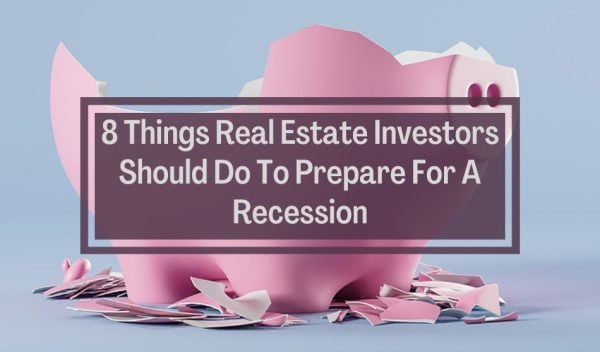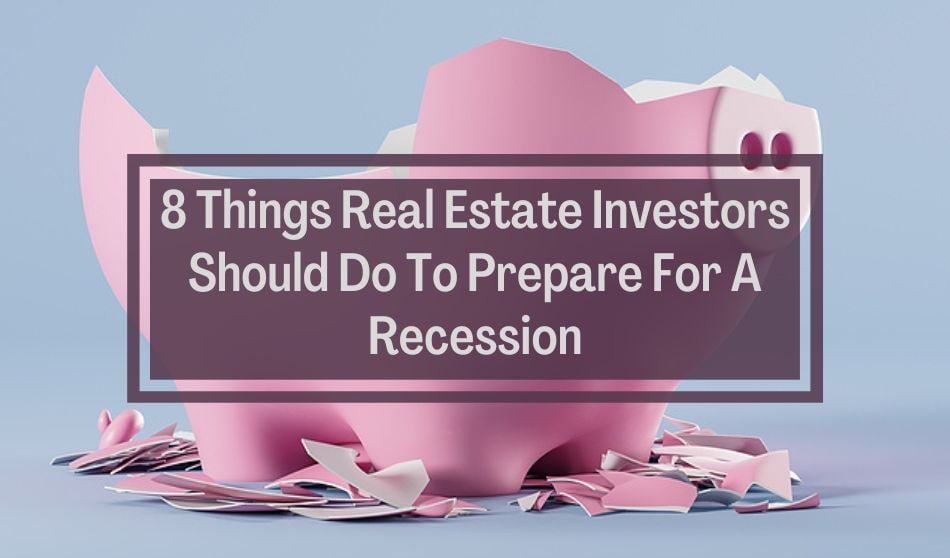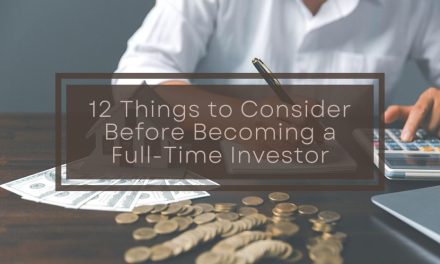
Many experts believe the next recession is inevitable, but how bad will it be?
Some economists are hopeful that this won’t be anything like the downturn of The Great Recession that spanned from 2007 to 2009. One reason for that is evidence of stronger balance sheets for most households. The COVID-19 pandemic forced people to stay at home, which naturally resulted in bigger savings accounts. Without restaurants, hotels, and other options for entertainment, there weren’t many places to spend.
Regardless of how it plays out, and how soon it happens, it’s still important to brace for impact. Preparation is key to thriving amid an economic downturn. Fortunately for real estate investors, there are many takeaways from the last recession that may help you navigate the next one.
Here are 8 things you can do to prepare your investments for a recession.
Pay Attention to Interest Rates
Interest rates are usually a good indicator of the health of our economy. As interest rates continue to rise, so does the cap rate, which refers to the rate of return on an investment property.
Rising interest rates will affect each investor differently as every portfolio is unique. If you’re looking to sell, you may enjoy strong returns. However, borrowing to make a purchase is going to cost you more. Further, rising interest rates can help you if you have the opportunity to raise rents on properties you already own. In general, rising interest rates result in fewer people who can qualify for a mortgage. This leads to a larger population searching for high-quality, long-term rentals.
Stay engaged and follow the numbers. This will help you have a clear view of what’s to come.
Create Short-term Goals for Long-term Success
Economic downturns often cause panic and uncertainty. This is when people tend to make rash decisions that eliminate years of investment progress. Think about your definition of long-term success and have confidence in the portfolio you’re building.
Rather than looking at the big picture, focus on short-term goals that are within reach. For instance, how can you extend the leases of your current tenants? Get to know the individuals and families who are renting from you and find ways to bridge the gap. This short-term progress can lead to long-term success.
Track Expenses
This is a great time to analyze your portfolio and make any necessary adjustments. Perform a “stress test” by considering how different scenarios would affect you. For example, what if your tenants paid 60 days late? What if your property was vacant for double the amount of time it usually takes to turn over?
Simply put, this is the time to save as much as you can to prepare for unforeseen events. Hold off on any large and optional expenses, such as a new car or a large home improvement project.
Continue Learning and Networking
When the market is hot, you’re probably busy with day-to-day business dealings. As it slows down, take this as an opportunity to continue to learn. Read and research all you can about the market and how past economic downturns affected real estate investors.
Likewise, attend networking events and think about diversifying your portfolio. Now is the perfect time to expand your options and consider other markets. Even if it’s far off, doing the research now will pay off in the long run. When the time is right, you will have everything you need to make your move.
Improve Brand Awareness
Focus on elevating your brand with stellar digital marketing. Take time to make necessary improvements and updates to your website. Haven’t started a blog yet? Powerfully use your expertise by writing at least one blog post a week about the real estate industry.
Great marketing during a recession can help:
- Drive more traffic to your website
- Find great long-term tenants who are reliable
- Generate bigger profits when the time is right
Continue to think out of the box when it comes to marketing yourself and your properties. Speak as a guest on real estate podcasts or offer to speak to local journalists for stories about the real estate market. There are always more ways to put yourself out there.
Invest in Current Properties
An economic downturn makes it increasingly difficult to find deals, which is why it’s usually a bad time to buy.
Use your money wisely by investing in any of your properties that could use an upgrade. The key here is to make sure that whatever project you embark on will give you a return on the money you’ve invested.
Kitchen and bathroom remodels typically provide the best return on investment. If yours are lacking, it may be the perfect time for a renovation. Similarly, a bedroom addition may help you raise rent prices by providing more square footage.
Buy Without Compromising
If you do have the ability to buy in a volatile market, make sure you aren’t compromising.
Every investor has certain things they’re looking for. Whether you need to diversify your portfolio or expand into other markets, only invest if you can find exactly what you’re looking for.
Continue to search for red flags before making a purchase, always taking the time to complete thorough inspections. If it seems too good to be true, it probably is.
Be Patient
Real estate is an inherently risky business. There are going to be highs and lows along the way, which you’ve probably learned by now. Remain patient, but stay engaged.
By keeping your eye on the prize, you’ll be ready when there is a dip in prices. Study the fluctuations and prepare for the right time to buy that property you’ve had your eye on.
While uncertainty can be uncomfortable, it’s a natural part of the industry, not to mention the economy as a whole. Remember why you chose the properties you have and stay invested if you can. It will pay off in the long run.





